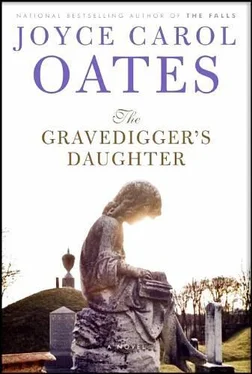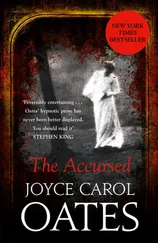Except then rousing herself to say, with a disdainful laugh, Why’d anybody want old picked bones in a rag-bag? Not her.
Calmly Pa said, You despise me, don’t you.
Calmly Pa said, Tell you what, Ma. I’ll buy a gun. Shotgun. You can blow Jacob Schwart’s head off, Ma. Spray his brains all over your precious wall.
But Rebecca’s mother had drifted away, indifferent.
Those lonely hours even after she’d started first grade. Following Ma around like a puppy. Hoping that Ma might say, Help me with this, Rebecca. Or, Rebecca, come here! And Rebecca would come eagerly running.
Those years. Rebecca would remember how they’d worked together, often in silence. From the time Rebecca was a little girl until the age of thirteen, when Anna Schwart died.
Died Rebecca would say. Not wishing to say Was killed .
Not wishing to say Was murdered .
And yet during all these years (preparing meals, cleaning up after meals, doing laundry, dusting and scrubbing and shaking out rugs) they never spoke of serious things. Never of essential things.
Rebecca’s mother became enlivened, a catch in her voice, only when she warned Rebecca of danger.
Don’t wander along the road! Stay away from people you don’t know! And even if you know them don’t climb into any car or truck! And stay away from that canal! There’s fishermen that come there to fish, and there’s men on the canal, in boats.
See, you don’t want anything to happen to you, Rebecca. You will be blamed if something happens to you.
You’re a girl , see.
At that school you be careful, things happen to girls at school. Plenty of things. Nasty things. Boys calling to you like from a cellar, or inside something, or hiding in a ditch you run away from them hard as you can, see you’re a girl .
Ma worked herself up into a passion, speaking at such length. Never, at other times, did Ma speak at such length. Warning too that Rebecca should not make the mistake of following her brothers, they were boys and they’d run off and leave her, you’re a girl .
Rebecca came to see that it was like a wound. Being a girl .
School! It was the great event of Rebecca’s young life.
Her mother had bitterly opposed her going. Her mother had tried to keep her home until the very last day. For Rebecca had to walk by herself a half-mile along the Quarry Road before being joined by other children; and, in any case, Ma did not trust these other children for they lived in a run-down shack close by the town dump.
Yet Ma showed no interest in Rebecca’s school, apart from these theoretical dangers. It was as if, when the dangers failed to materialize, she was scornful of school as she was of Milburn and their neighbors. Of course, she would not visit the school as other parents did. (Nor would Jacob Schwart visit the school.) Neither of Rebecca’s parents would do more than glance at Rebecca’s report cards. It would be years before Rebecca realized that her mother could not read English, and so she disdained all printed materials: she was capable of tossing out Rebecca’s schoolbooks with her husband’s old newspapers and magazines they meant so little to her. She paused only to look at photographs, occasionally. Once, Rebecca saw her in the kitchen staring at a photography feature in Life of fallen, bloodied, part-naked men, women, and children, sprawled amid rubble in some far-off city. When Rebecca came closer to peer at the caption, her mother jerked the magazine away and slapped Rebecca’s face with it.
“No. It is not for a girl’s eyes. Bad .”
And once I saw her, who had expressed such a terror of snakes, kill a snake with a hoe . We were hanging clothes on the line and a copperhead came out from under the house, in the grass about twelve inches from my feet and Ma said nothing but went for the hoe that was leaning against the side of the house and chopped at the snake chopped and chopped wildly at it until the snake was dead, bleeding and mangled .
At the Milburn Elementary School, Rebecca’s first grade teacher was Miss Lutter who identified herself on the first day of school as a Christian. Miss Lutter was a thin woman with dust-colored hair and teeth that poked through her tight-pursed lips when she smiled. She told Rebecca and the others that they had souls that were “little flames” inside their bodies, in the area of their hearts; these little flames would never go out, unlike ordinary fire.
Rebecca, who had never heard such a thing before, knew at once that this must be so.
For: the coal-burning stove and the wood-burning stove in the Schwarts’ house were all that kept the house from freezing in the bitter cold of winter, so it was that the flames inside a person kept him or her from freezing, too. Almost, Rebecca could see the flames inside her father and mother, behind their eyes; yet she knew she must not speak of this to them. For any authority outside the family would enrage them.
Any belief of those others told to their children would enrage them.
And there is a fire in me, too .
This revelation made Rebecca so happy, she wished there was her sister Freyda to share it with.
“”Rebecca Esther Schwart.“”
He was making fun of her, was he? Her name? Or-who she was?
For she felt its impact, here amid strangers. How harsh the final blunt syllable Schwart struck the ear like the flat of a shovel wielded as a weapon.
“”Rebecca‘-are you here?“
Miss Lutter nudged her. She woke from her trance, rose and tremulously made her way into the aisle, and up to the lighted stage. A roaring of blood in her ears mingled with the applause of the audience-so loud! Like flames crackling. Rows of strangers, those others Pa would disdain them, yet smiling at her as vigorously they clapped their hands as if for these fleeting seconds in their lives the dark-haired gypsy-looking Schwart girl, the gravedigger’s daughter, wasn’t a figure to be pitied.
“”Rebecca‘?-congratulations.“
She was too frightened to murmur Thank you. She could not clearly see the face of the man who was addressing her, glittery glasses, a striped necktie, she’d been told his name and who he was and of course she’d forgotten. Desperately she reached for whatever-it-was the man was handing her-a hefty book, a dictionary-there was a tittering of amusement in the audience when, not expecting the book to be so heavy, Rebecca nearly dropped it. The glittery-glasses man laughed and caught the book-“Whoops, Little Miss!”-to hand to her more securely and in that instant she saw him staring at her curiously, as if memorizing her the Schwart girl the gravedigger’s daughter poor child sent to school looking like a savage .
In a haze of embarrassment and confusion Rebecca stumbled back off stage and returned to her row, and to her seat, where Miss Lutter was smiling at her, as the next name was being called.
It was April 1946. She was ten years old, and a winner of the Milburn School Township Spelling Bee. She had represented her grammar school, that was District #3. For weeks she had memorized lists of words. Such words as profligate , precipitant , precipitate , epithet , dysphoria , expurgate , quotidian , lapidarian , lacrymose , stationary , stationery , unparalleled , inchoate , heinous , dais , dour , err , harass , impious , forte , slough , prophecy , prophesy , forgo , forego , resuscitate , genealogy , sacrilegious , braggadocio , gnomic , tortuous , fortuitous , contingency , autarky , temerarious , encomium . Like other students who’d memorized these word-spellings Rebecca had only the dimmest idea of what they meant. They were mysterious sounds, syllables that might as readily have been in a foreign language as in the language known as English. A game it was, learning-to-spell. Yet it was a game that made you nervous, twitchy and sweaty through the night. Miss Lutter had insisted that Rebecca could compete with older students in the junior high school and so out of a terror of failing and disappointing her teacher Rebecca had memorized the words and Rebecca had won over the other children and now Miss Lutter was proud of her, and squeezing her icy hand; and the roaring in her ears began to subside.
Читать дальше












